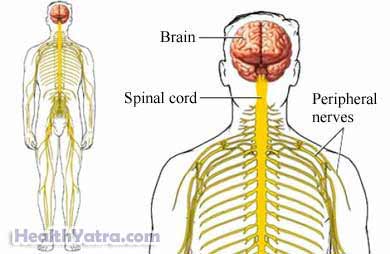Definition
Multiple system atrophy (MSA) is a disorder of the nervous system. It leads to a gradual worsening of symptoms. Once symptoms develop, the average life expectancy is ten years or less.
MSA is sometimes called a Parkinson’s plus syndrome because many of the symptoms are similar. There are different types MSA based on the most apparent symptoms. One type was formerly known as Shy-Drager syndrome.
Causes
The cause of MSA is unknown. The symptoms are caused by degeneration of nerves throughout the brain and spinal cord. These nerves control automatic functions like balance and muscle coordination. The damage to the nerve may be caused by a buildup of a specific protein but this is not a confirmed cause.

Risk Factors
Men are twice as likely to develop MSA than women. It tends to appear between 50-60 years of age.
Symptoms
Symptoms of MSA can vary greatly. If you have any of these symptoms do not assume it is due to MSA. These symptoms may be caused by other conditions. Initial symptoms are similar to those of Parkinson disease. These initial symptoms may also be determined by the type of MSA:
- Type MSA-A is associated with orthostatic hypotension. This is a problem managing blood pressure when moving from sitting to standing. It can lead to dizziness or fainting.
- Type MSA-P is associated with symptoms similar to initial Parkisnon symptoms such as:
- Slow, stiff movements
- Tremors
- Clumsiness (loss of balance and coordination)
- Shuffling
- Type MSA-C is associated with:
- Difficulty swallowing
- Problems speaking and hoarseness
- Difficulty coordinating muscle movement
As the disease progresses, symptoms will cross over types and become more severe. Many will develop muscle coordination problems and need walking aids. Other problems that may exist across type include:
- Problems with bladder control
- Erectile dysfunction
- Muscle tightening around a joint that prevents free movement
- Problems with posture such as leaning to one side and forward head bend
- Inappropriate laughing or crying
- Excess yawning
- Vision problems
- Changes in writing
Diagnosis
Your doctor will ask about your symptoms and medical history. A exam of the nervous system will also be done. You will likely be referred to a specialist.
Diagnosing MSA can be difficult. Other diseases will need to be ruled out. Tests to help rule out other diseases include:
- MRI scan—to look for abnormalities in the brain
- Blood tests
- Lumbar puncture—to evaluate spinal fluid
Tests will also be done on your heart rate and blood pressure. These tests will help determine what is causing problems with your autonomic nervous system. Nerve impulses to your muscles may also be tested.
Treatment
There is no cure for MSA. Treatment will focus on managing the symptoms and supportive care. Talk with your doctor about the best plan for you. Options include the following:
Medications
Various medications may be used to manage the symptoms of MSA. Medication may be given to:
- Relieve muscle rigidity
- Stabilize mood
- Manage orthostatic hypotension
- Relieve other symptoms such as constipation, urinary control problems, or erectile dysfunction
Therapy
- Physical therapy—to help keep muscles strong and maintain range of motion.
- Occupational therapy—to improve ability to do daily tasks such as eating, grooming, and dressing.
- Speech therapy—to help with speaking and swallowing.
- Respiratory therapy—Continuous positive airway pressure (CPAP) for sleep apneaand other breathing problems during sleep
Dietary Support
Dietary changes in salt and fluids may help manage orthostatic hypotension.
Soft or pureed foods may be helpful with swallowing problems.
A feeding tube may be needed in later stages of MSA. It will deliver nutrition directly to the stomach.
Prevention
There are no known guidelines to prevent MSA since the cause is not clear.
